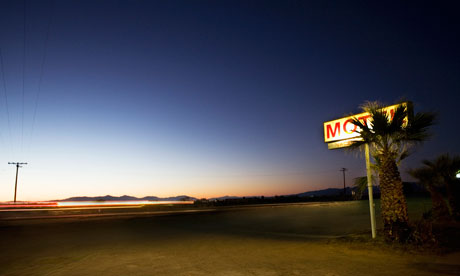
Mickflanny's been doing a bit of rereading. Not just any old rereading though, he's been enjoying "one of the most underrated fiction writers of the last century", Flannery O'Connor.
"Nearly fifty years since her death her stories still enchant new readers and her work continues to be found as fertile ground for criticism and consideration – especially for adherents of that most arcane of American fictional landscapes: the Southern Gothic."
For Flanny, O'Connor's American South is a fictional landscape "as rich in its history and culture as Tolstoy or Flaubert and as fantastic as Tolkien", a place where "the chiaroscuro of Rembrandt meets the folk-surrealism of Thomas Hart Benton, and where the innocence of early Disney cartoons meets the angst and foreboding of Alfred Hitchcock".
He hails the humanity O'Connor gives her characters, despite their absurdity, and the the "immaculate prose" with which she does it. As a Southerner himself, Flanny finds her work crucial to understanding the "racial, religious, political and class struggles" of his birthplace.
"But it's the people and places of her stories, what drives them, what calls to them, and the humanity inside them, that brings me again and again to this book ... Travelling down the back highways of her world is a journey that the reader will never entirely return from."
Christopher Philip Howe, by contrast, is right up to the minute with his review of Kirsty Gunn's latest novel, The Big Music. But wait a minute, there's some metafictional trickery going on here:
"In her introduction she tells us that the book is a selection from some 'papers that were presented to me,' and that she has 'arranged' them. The papers as they appear in the novel are written as a third person narrative. So they must have been written by someone trying to tell a story. But who?"
All this messing about with narrative takes "great courage and confidence", continues Howe, and "may … sound daunting", but "Sometimes though, as a reader, you just have to go with it and trust the author."
"In this case, the sheer beauty of the writing makes such a leap of faith very easy. Set in the far north of Scotland, the people, the life and the landscapes jump off the page and surround you. Couple this with a multi-generational sweep across a family history, a deep understanding of what music is, really, and bagpipe music especially – so much more than the notes themselves – and the social, cultural and political context of the Scottish highlands, and you have a true masterpiece."
If you have another masterpiece to salute, head on over to our book search page, and add your review. Thanks to everyone who posted a review on the site these week – if I've mentioned you above, drop me a line at richard.lea@guardian.co.uk and I'll send you something marvellous from the cupboards.

